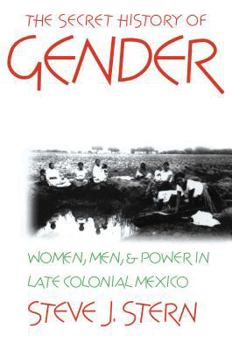Secret History of Gender: Women, Men, and Power in Late Colonial Mexico
Select Format
Select Condition 
Book Overview
In this study of gender relations in late colonial Mexico (ca. 1760-1821), Steve Stern analyzes the historical connections between gender, power, and politics in the lives of peasants, Indians, and other marginalized peoples. Through vignettes of everyday life, he challenges assumptions about gender relations and political culture in a patriarchal society. He also reflects on continuity and change between late colonial times and the present and suggests a paradigm for understanding similar struggles over gender rights in Old Regime societies in Europe and the Americas.
Stern pursues three major arguments. First, he demonstrates that non-elite women and men developed contending models of legitimate gender authority and that these differences sparked bitter struggles over gender right and obligation. Second, he reveals connections, in language and social dynamics, between disputes over legitimate authority in domestic and familial matters and disputes in the arenas of community and state power. The result is a fresh interpretation of the gendered dynamics of peasant politics, community, and riot. Third, Stern examines regional and ethnocultural variation and finds that his analysis transcends particular locales and ethnic subgroupings within Mexico. The historical arguments and conceptual sweep of Stern's book will inform not only students of Mexico and Latin America but also students of gender in the West and other world regions.
Stern pursues three major arguments. First, he demonstrates that non-elite women and men developed contending models of legitimate gender authority and that these differences sparked bitter struggles over gender right and obligation. Second, he reveals connections, in language and social dynamics, between disputes over legitimate authority in domestic and familial matters and disputes in the arenas of community and state power. The result is a fresh interpretation of the gendered dynamics of peasant politics, community, and riot. Third, Stern examines regional and ethnocultural variation and finds that his analysis transcends particular locales and ethnic subgroupings within Mexico. The historical arguments and conceptual sweep of Stern's book will inform not only students of Mexico and Latin America but also students of gender in the West and other world regions.
Format:Hardcover
Language:English
ISBN:0807822175
ISBN13:9780807822173
Release Date:January 1995
Publisher:University of North Carolina Press
Length:496 Pages
Weight:2.15 lbs.
Dimensions:1.0" x 6.1" x 9.3"
Customer Reviews
1 rating
Amazing research--a MUST-READ for gender scholars and scholars who hate 'gender'
Published by Thriftbooks.com User , 18 years ago
For those who love 'gender' as a lens through which to analyze other social processes (warfare, citizenship, empire- or nation- formation, etc.) this may not be the book for you: this is an actual analysis of Gender itself. The author looks at the relations between men and women in peasant communities in Mexico, using concrete examples of real families that went through the justice system. But not just husbands-wives--he addresses daughters-parents (mother/father), sisters-brothers, AND fathers-sons, brothers-brothers... Priests-parishioners... he really looks at patriarchy as a system that organized society NOT as static and merely oppressive, but dynamic and unstable. And he looks at how patriarchy not only organized men-women relations, but relations between the rich and poor AND politics and power, in the most convincing way I have read so far. It's GREAT in that regard--but getting through the INSANELY NUMEROUS examples and statistics gets pretty tiresome...






